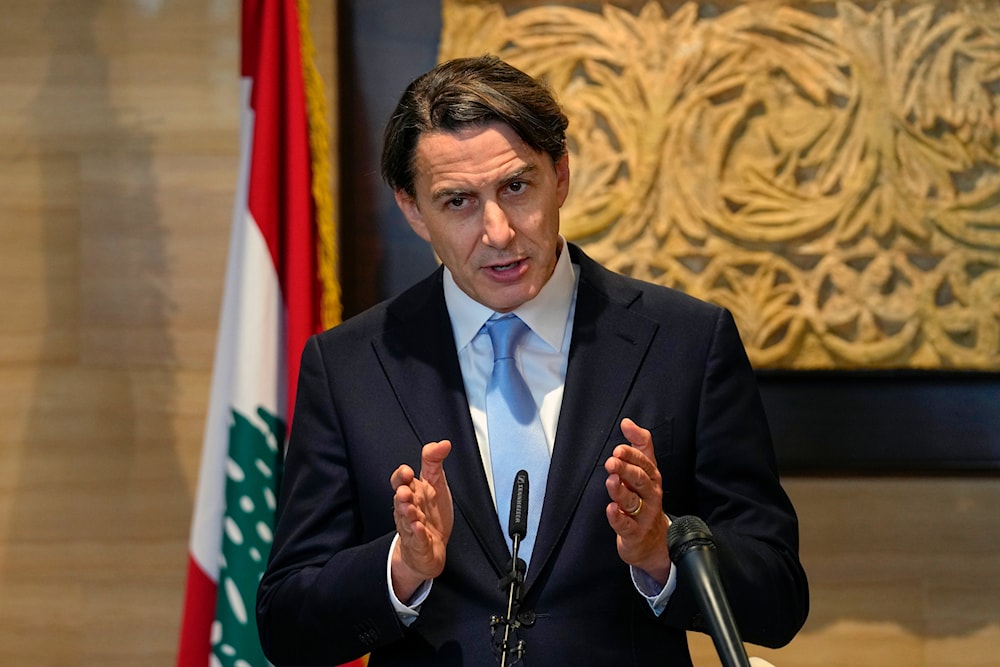'Israel' hands White House demands for ceasefire in Lebanon: Axios
Both parties seek a ceasefire, yet the Israeli government persists in proposing demands that infringe on Lebanese sovereignty and call for a foreign presence along the border.
-

Senior Advisor to US President Biden, Amos Hochstein, talks to the media after meeting with Parliament Speaker Nabih Berri in Beirut, Lebanon, on March 4, 2024. (AP)
The Israeli occupation government submitted a document to the US Department last week outlining its conditions for a ceasefire to end the war in Lebanon and enable the return of displaced civilians, Axios reported, citing US and Israeli officials.
The document was delivered by Israeli Minister for Strategic Affairs, Ron Dermer, on Thursday, ahead of President Biden's envoy Amos Hochstein's visit to Beirut on Monday to seek a resolution to the war.
Israeli officials indicated that the document reflects key principles discussed with the Israeli Ministry of Security and the Israeli Occupation Forces, emphasizing what "Israel" demands in any diplomatic solution to end the war.
'Israel's demands violate Lebanese sovereignty'
One of the demands includes Israeli Occupation Forces' engagement along the border to ensure "active enforcement" that prevents the Islamic Resistance in Lebanon from rebuilding military infrastructure in southern Lebanon near the border, an Israeli official told Axios.
Another demand is for "Israel" to have the freedom to operate in Lebanese airspace, which would constitute a blatant violation of Lebanon's sovereignty.
These two demands contradict UN Security Council Resolution 1701, which mandates that the Lebanese Armed Forces (LAF) and the UN Interim Force in Lebanon (UNIFIL) enforce a ceasefire between "Israel" and Hezbollah.
"We are talking about 1701 with increased enforcement. Our main message is that if the Lebanese army and UNIFIL do more, the IDF will do less and the other way around", the Israeli official told Axios.
However, a US official expressed skepticism about those demands, noting that the Lebanese side would likely oppose the new conditions, as they would "dramatically undermine Lebanon's sovereignty."
'Last card for a ceasefire before US elections'
Hochstein is scheduled to arrive in Beirut on Monday for discussions with caretaker Prime Minister Najib Mikati, Speaker of Parliament Nabih Berri, and other Lebanese officials regarding the Israeli demands.
On Sunday, Berri said that Hochstein's visit is "the last chance before the US elections to reach a solution" to the war on Lebanon. He emphasized that there is consensus in Lebanon regarding UN Resolution 1701 and firmly stated his refusal to amend it.
Despite these tensions, Hochstein is advocating for a significantly increased deployment of the Lebanese Armed Forces in southern Lebanon as a key component of a resolution to the war. According to US and Israeli officials speaking to Axios, he is specifically calling for the deployment of at least 8,000 Lebanese troops in the region.
Additionally, the US envoy seeks to enhance UNIFIL's mandate to assist the Lebanese army in preventing armed individuals or groups not under the Lebanese government's control from being stationed near the border with occupied Palestine. This implies a desire to increase the presence of foreign troops along the border, a condition likely viewed by the Lebanese government and the Lebanese Resistance as prioritizing foreign interests over Lebanon's own.
Earlier, the caretaker Minister of Agriculture, Abbas Hajj Hassan, told Al Mayadeen that the Lebanese government seeks a ceasefire plan in Lebanon, adding that the Lebanese authorities have clarified to all diplomatic delegations that Lebanon wants the Israeli occupation entity to agree to a ceasefire that would end the aggression.
He highlighted that the Lebanese government's stance is "clear," pointing to hurdles placed by the Israeli government on a possible deal. "Israel is trying to drown the region in a boundless volcano of fire," he underlined, saying that "the battlefield will facilitate the diplomatic negotiation process."
Read next: War on Lebanon, Gaza dealing major financial blows to 'Israel': Report

 4 Min Read
4 Min Read








